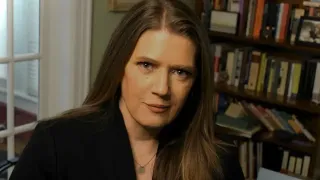February 6, 2014
Gay Gulag
Kilian Melloy READ TIME: 5 MIN.
LGBTQ veterans and local elected officials expressed their opposition to Defense Secretary Pete Hegseth’s renaming of a Naval vessel for the slain San Francisco gay supervisor and civil rights pioneer Harvey Milk, calling it an insult. They also emphasized the matter is a distraction from cuts and other issues at the United States Department of Veterans Affairs.
Zoe Dunning, a lesbian and former naval commander who fought against “Don’t Ask, Don’t Tell” and was the only out person to have remained on active duty after coming out under the policy, was one of those who spoke during a news conference at Jane Warner Plaza in San Francisco’s Castro LGBTQ neighborhood June 6.
“This is an affront to every LGBTQ veteran and servicemember who wears the uniform or has worn the uniform,” said Dunning, who retired from the Navy in 2007.
Dunning was a naval officer in 1993 when she declared she was a lesbian at a rally in support of another gay service member. She appealed a decision to be discharged, and the Navy administrative board agreed her remarks did not violate the rules as they were written at the time, because she did not reveal her sexual orientation to the armed forces, and because she did not engage in “homosexual conduct.” (The rules were later updated to close this loophole before DADT – the military’s ban on open service by LGBQ people – was lifted in 2011.)
Dunning said those days were dark, saying investigators would take down license plate numbers at gay bars to try and find closeted servicemembers. Of one lesbian colleague she said, “her diary was confiscated and she was forced to resign.”
In the years since the repeal, the military’s attitude toward LGBTQ people has largely been dependent on the occupant of the White House. Democratic former Presidents Barack Obama and Joe Biden allowed open service by trans people while President Donald Trump banned it under both his administrations. June 6 happens to be Hegseth’s deadline for transgender service members to identify themselves and begin to leave, CBS News reported.
On June 3, it was revealed Hegseth wants the Navy to rename ships named for civil rights pioneers, including Milk, the late Latino labor leader Cesar Chavez, slain Black civil rights activist Medgar Evers, and Harriet Tubman, the abolitionist and Union spy who led slaves to freedom through the Underground Railroad after she escaped from slavery herself, among others. All the ships are in the John Lewis class of naval vessels, which are named for civil rights leaders. The move was done during Pride month deliberately, military.com reported when it broke the story.
The juxtaposition incensed gay Marine Corps veteran Commander Mario Benfield, who now leads the Alexander Hamilton Post 448 of the American Legion.
“These red-blooded Americans volunteered to serve in our military and now they are supposed to give it up because of his [Hegseth’s] homophobia," Benfield said. “This demonstrates poor leadership. Not only has he done this but he’s sowing mistrust in the armed forces. Instead of building trust, he’s creating havoc in the military.”
Benfield referred to Hegseth’s move to oust General Charles Q. Brown Jr. as chairman of the Joint Chiefs of Staff, the country’s highest ranking military officer. Brown, a Black man, had been appointed by Biden, replacing General Mark Milley. (In the past, the chairmanship had not been a partisan position.)
“There were so many others more qualified than him,” Benfield said of Hegseth, who served in Iraq and Afghanistan before becoming executive director at Vets for Freedom and Concerned Veterans for America and a host on Fox News before Trump tapped him to lead the Pentagon. (His tenure at the veterans’ groups garnered controversy.)
Hegseth was on duty with the District of Columbia Army National Guard from 2019-2021. He was barred from serving at Biden’s inauguration that year due to having a Crusader slogan as a tattoo that sports the phrase “Deus Vult,” or “God Wills It.”
Jimmy McConnell, who served in the Oklahoma Army National Guard from 1983-1989, said during the press event that he is “heartbroken.”
“In two years we can take the House back,” he said, referring to the 2026 elections. Echoing remarks Milley made several years ago, McConnell said, “We swore an oath to defend the Constitution, not some dictator, and I am not bowing down to a dictator.
“This is America,” he said. “This isn’t North Korea.”
Milk, the first openly gay elected official in California, was assassinated November 27, 1978, along with then-mayor George Moscone, at San Francisco City Hall by disgruntled ex-supervisor Dan White. Nearly two decades prior Milk had served in the U.S. Navy, but threatened with being court-martialed on a charge of "participation in a homosexual act" with another serviceman, he opted to resign and was given an "other than honorable" discharge on February 7, 1955, according to a trove of naval records obtained by the Bay Area Reporter five years ago. https://www.ebar.com/story/49066
Veterans service cuts
Gay Board of Supervisors President Rafael Mandelman, who as the Castro’s representative on the board, holds the job Milk once did; and gay state Senator Scott Wiener (D-San Francisco) expressed outrage about Hegseth’s move, but spent much of their remarks focusing on the effects of Trump’s policies and proposals on veterans.
“This administration is attacking not just queer people, but American people, all of us,” Mandelman said. “They want us to talk about the ship, and we will talk about the ship … but they are trying to distract everyone.”
An internal memo at the Department of Veterans Affairs shows the administration is planning on slashing 80,000 jobs, the Associated Press reported.
Senator Patty Murray (D-Washington), former chair of the Senate Veterans' Affairs Committee, came out with a report in April linking the firings of over 2,000 VA employees by Trump and one-time special adviser Elon Musk, who led the Department of Government Efficiency, to the deterioration of veteran services.
“Our supply team is now more than seven days behind on placing critical supply requests for medication and equipment in our hospital, and our supply techs have had to cut their night shifts, limiting deliveries to our clinics,” stated Future Zhou, a disabled veteran who was fired as inventory manager at the Puget Sound VA Medical Center in Washington state, in the report. “I saw nurses going down to the warehouse to collect their own supplies in order to continue to provide quality care to our veterans. I am not confident that the hospital can remain open under these conditions.”
NBC News reported that Trump’s budget, the Big Beautiful Bill now before Congress, would push the Supplemental Nutrition Assistance Program (also known as food stamps) onto states at a time when veterans are two and a half times more likely to face food insecurity, a fact Mandelman mentioned when he said the administration is attacking “even food for veterans.”
Dunning said, “The cuts to the VA we are seeing is an affront to our veterans.”
Wiener pronounced, “How dare they claim to be supporting veterans when they are undermining their ability to get health care … and removing the name of a veteran from a Navy vessel.”
Wiener said that the renaming is an attack on all LGBTQ people.
“We need to be very clear – they want all LGBTQ people to go away, and we aren’t going anywhere,” Wiener said.






